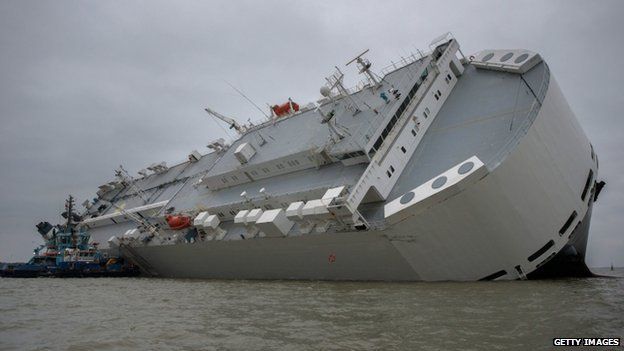Cargo ship Solent: Next 24 hours 'critical', expert says
- Published

The ship's insurers said salvage costs would usually be covered by the vessel's owners
The next 24 hours are "critical" in the bid to refloat a stricken cargo ship, an expert has said.
The Hoegh Osaka ran aground in the Solent off the coast of the Isle of Wight late on Saturday and is listing at 45 degrees on Bramble Bank.
The salvage master tasked with refloating the Costa Concordia cruise liner, Capt Nicholas Sloane, said salvors face a "critical situation".
He said the next 24 hours are "crucial for the local conditions and the wash".
"The main thing is to stabilise and bring her upright," he said.
"The next 24 hours are critical to see the behaviour of the sandbanks, whether the sand migrates away from the starboard side or the port side.
The ship is 51,000 tonnes and was only one third full
"The tidal conditions could cause some erosion of the sand itself."
Salvage experts from Svitzer boarded the ship on Monday and are carrying out an assessment to form a rescue plan.
A spokeswoman for the ship's insurers Gard said the vessel itself would be covered under a "hull and machinery" product while liability for loss and damage, including any future pollution, was covered by a "P&I" (Protection and Indemnity) policy.
She said salvage costs would usually be covered by the ship's owners but they could try and claim against part or all of the costs.
A press conference has also been called for 16:00 GMT where an update will be given.
Capt Sloane said it was "unlikely" the incident was caused by human error and was possibly an electrical fault with sensors which control the ballast, or ballast pumps.
He was in charge of refloating the Costa Concordia cruise ship, which sank off the coast of Tuscany in Italy in 2012, killing 32 people.
Ingar Skiaker, chief executive of Hoegh Autoliners, said in a press conference after the incident the crew deliberately ran the ship aground to avoid further damage.
There are 1,400 cars on board, including 1,200 Jaguar and Land Rover products, 65 Minis as well as 105 JCB machines.
JCBs destined for the Middle East are among the machinery on board the stranded vessel, shown before the ship left Southampton
Eric Williams, whose company Williams Shipping is working with the salvage team, said he was told the cars were well strapped down and not as badly damaged as feared.
Teams are working to assess how best to refloat the cargo ship
He said: "We were told that the cars were still strapped down in position, which is incredible. We understand that some of the heavy machinery has moved."
The ship ran aground 50 minutes after setting sail from Southampton
There are also 500 tonnes of fuel on board, most of which is marine diesel oil. Experts plan to leave this safely aboard the ship for the time being, as it has been secured and poses no risk to the environment.
One crew member out of 25 rescued by RNLI Lifeboats and the Solent Coastguard on Saturday was injured.
Two senior officers and a pilot stayed on board before being taken ashore.
The 51,000-tonne transporter, registered in Singapore, set sail from Southampton for Germany at about 20:20 GMT on Saturday.
- Published5 January 2015
- Published5 January 2015
- Published4 January 2015
- Published4 January 2015
- Published4 January 2015